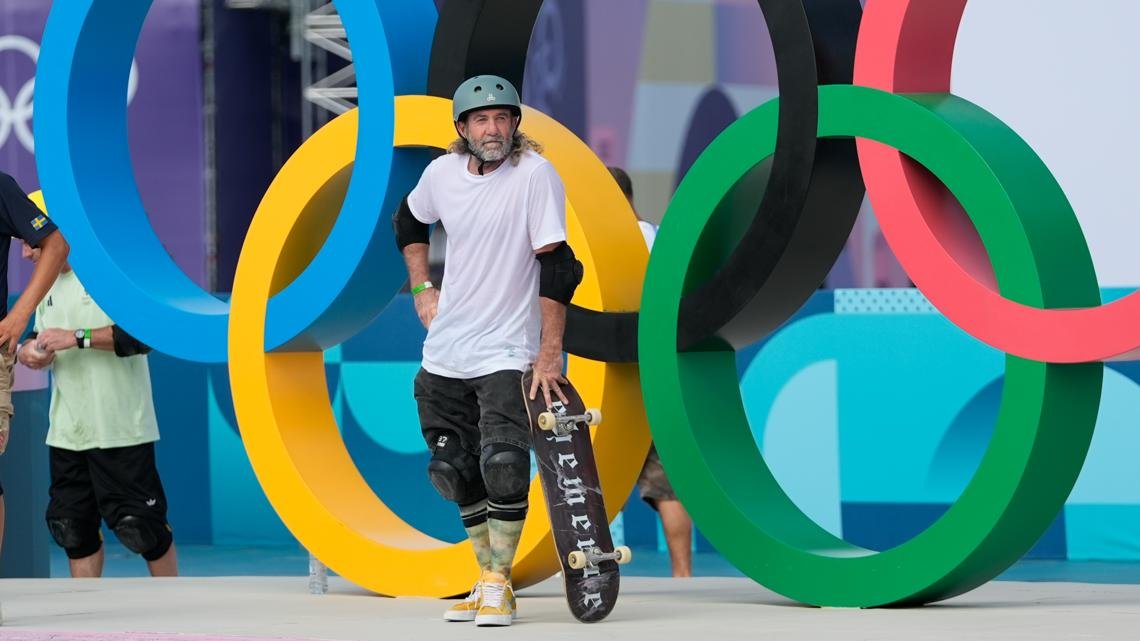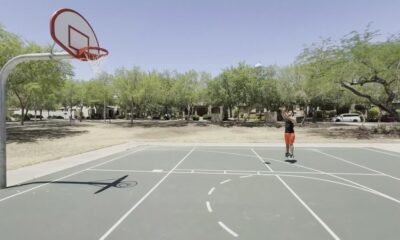General News
49-Year-Old Skateboarder’s Epic Quest: From Dragon Encounters to Olympic Dreams 2024

“I’ve kind of accepted I’m going to come last. It doesn’t matter to me,” says Dallas Oberholzer, a 49-year-old skateboarder from South Africa.
PARIS, France — Among the 10,500 athletes at the Paris Olympics, South African skateboarder Dallas Oberholzer may be the only one who encountered dragons during his journey to the 2024 Games.
The 49-year-old ventured into the Peruvian jungles, guided by a shaman, to experience the hallucinogenic brew ayahuasca. This was part of his preparation for the Olympics, an event for which he also competed in Tokyo, finishing last in the men’s park event.
Vivid visions accompanied his ceremony: a jaguar, an anaconda, vibrant colors, and dragons reminiscent of those in “Game of Thrones.” “I saw dragons! I was flying with dragons. I was underwater with the dragons,” Oberholzer recalls. “I was lying basking in the sunshine with the dragons, charging up.”
Yet, his journey wasn’t merely a trip down a psychedelic path. Oberholzer hoped this experience would reset his mind for the immense challenge of competing at nearly 50 against much younger skateboarders. His opponent lineup includes those less than half his age, some as young as 16.
Only one competitor, 51-year-old Andrew Macdonald of Britain, is older. At the other end, the youngest participants — Viktor Solmunde of Denmark and others — are barely 16-18 years old, a combined age not even reaching half of Macdonald and Oberholzer’s total.
In 2021, the older skateboarders like Oberholzer and Rune Glifberg placed at the back of the pack in Tokyo, with 18-year-old Keegan Palmer of Australia taking the gold.
Oberholzer’s prospects in Paris don’t signal a significant change. “I’ve kind of accepted I’m going to come last. It doesn’t matter to me,” he says. For him, participation is more about maintaining the sport’s spirit despite its Olympic acceptance.
He fears the Olympics may dilute skateboarding’s core values, steering it towards medal-chasing rather than life experiences. “In the next few Olympics it’ll be nothing more than a bunch of 14-year-olds. So we sure as hell better enjoy the last few editions of the old-timers,” he says.
Oberholzer emphasizes that the older generation paved the way for today’s athletes. He is keen on preserving skateboarding’s essence of freedom and self-expression. He believes excessive regimentation could erode these values.
A year before the Paris Games, Oberholzer felt the weight of age and his nomadic skateboarding life. Financial constraints pressed him to rent out his Cape Town flat and manage without sponsors. He hopes to spend time with his girlfriend in Dubai post-Games but lacks visa money.
“It’s midlife crisis, man,” he admits. Over time, skateboarding became less financially rewarding, leading him to seek mental peace and reset. Emerging from the Peruvian jungle, he felt “supercharged” and free from his marijuana habit, a non-negligible benefit when facing Olympic drug tests.
“My peers have all noticed my skateboarding is improving and that’s all I really want,” he remarks. “It just shows that you need to work on your mental health and, yeah, just dig deep and go out there and explore.”
His immediate goal is to impress his mom who will be in Paris with his sister. “She says I got to have that one magic trick, and I’m still working out what it is,” he says.
“That’s about the only pressure I feel right now. I’m not going to get a medal. I just got to be my personal best. And, yeah, maybe it’s also just doing it for the old geezers out there. … Inspire a few people to step back on a skateboard or never give up.”


















